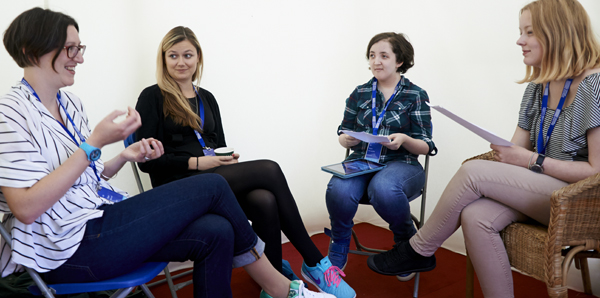This resource is great for:
All things YA! Learning about some fantastic YA authors, what makes a book YA (and why the genre is so amazing), getting top tips for writing your own YA fiction and finding motivation to start (and finish) writing a longer piece of fiction.
Summary:
An interview with Young Adult novelists Maggie Harcourt and Katherine Webber, and some activities to get you writing and talking about the genre.
Download this resource:
Why YA? with Maggie Harcourt & Katherine Webber – PDF
Why YA? with Maggie Harcourt & Katherine Webber – Word doc
Introduction:
“If you’re a teenager and you want to write, there’s nothing stopping you.” Katherine Webber
During the the 2017 Edinburgh International Book Festival we asked two of our young reporters, Abbie and Megan, to catch up with two stars of the YA genre, Maggie Harcourt and Katherine Webber. They found out why the authors chose to write YA fiction, what makes the genre so exciting and their top tips to get you writing YA yourself.
Read the interview here and then use the discussion points and activities below.
Activities – Discussion Points and Writing Activities
Part One
“There’s a scene in Wing Jones where she realises that team comes first. It doesn’t matter what your race is, it doesn’t matter what your sexuality is, it doesn’t matter if, you know, you’ve got two heads. First, you’re on the track team, and that’s what comes first.” Katherine Webber
Katherine and Maggie use their personal knowledge of specific communities – the convention circuit in Unconventional, a track and field team in Wing Jones – and reflect them in their writing.
Are you part of any communities? They might be part of your bigger school community, or related to hobbies or interests of your own, for example: sports, music, theatre, cosplay, maths club, literature society…
Use the prompts below to plan a piece of creative writing using this community as the setting:
- Imagine a character who would be part of one of these communities.
- Now imagine your character is going through a change in their life – what is it?
- Is your character already a part of the community, or does the change lead them to become part of it?
- Does the community help them with the change? Does it cause it? Or does it add to the problem?
Part Two
In the interview, Katherine talks about how she wrote her first draft of Wing Jones as part of NaNoWriMo (National Novel Writing Month), where participants are challenged to write the first draft of a novel (50,000 words) in only a month.
Take a look at NaNoWriMo and their Young Writers Programme.
One of the key benefits of NaNoWriMo is that the time constraint forces you to get the basis of a novel down quickly, which you can then go back to and edit at a later time.
Even if you don’t want to take part in the formal programme, you could replicate this urgency in class, dedicating a certain amount of time per day or per week to writing, challenging your class to write a certain number of words without worrying too much about style or editing. Pupils who struggle with plot or language might find this format freeing, and be surprised at what they can achieve.
You could use the prompt above, or a prompt from one of our other resources:
A Mind’s Eye Walk Through Your Town
Part Three
In the interview, Maggie and Katherine mention a number of other YA novelists including:
- Non Pratt
- Garth Nix
- Emma Cline
- Laini Taylor
- Leila Sales
Are you familiar with these authors? If not, then look them up on the internet or in your library – you might just find something new to read!
Or why not share book recommendations within your class? Ask each pupil to write the titles and authors of up to three YA novels that they’ve read and enjoyed on a piece of paper. Then swap lists with others in the class so that everyone can be inspired by the reading lists.
Part Four
“You have to be completely emotionally honest. Because, like you say, a YA reader is going to see through anything that is not honest. And they’re just gonna go No! and they’re just gonna chuck the book away and why shouldn’t they?” Maggie Harcourt
“Also if something happens to you that’s upsetting, or you have a strong emotional response to. When you’re like, why is this happening to me? It’s probably because you’re gonna write a book about it later. So, remember that, and dial into that emotion.” Katherine Webber
Use the authors’ comments above, and expanded upon in the interview, to start a discussion about emotions and dealing with difficult subject matters using fiction.
Discussion points:
- Which books have you read which made you have a strong emotional reaction?
- Why do you think you had such a reaction?
- Do you think that reading about emotional subjects in fiction can be helpful?
- Would you rather read (or write) about certain issues and emotions than discuss them with friends and family? Why is this?
Young reporters Abbie and Megan are taking part in What’s Your Story?, Scottish Book Trust’s development programme for teenage writers and illustrators. Find out more about the programme at www.thestoryis.co.uk
